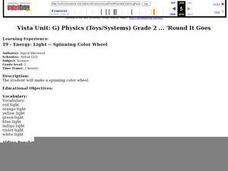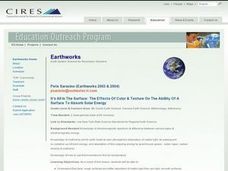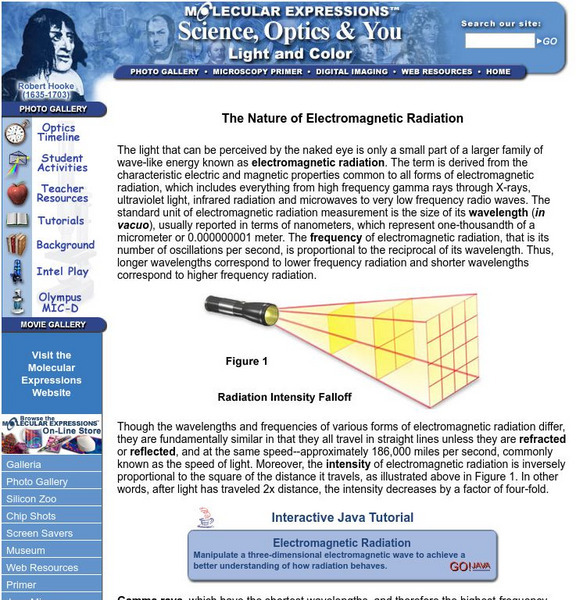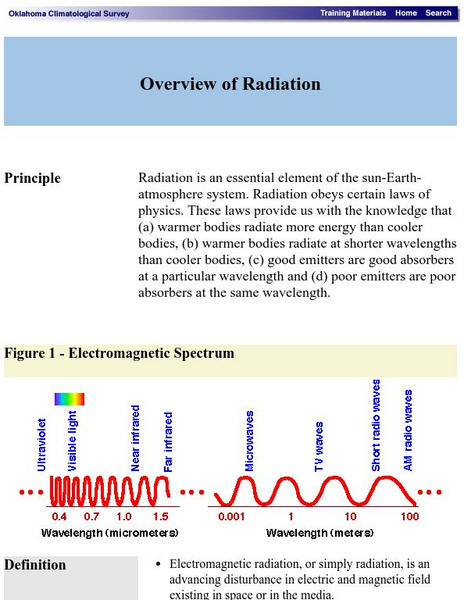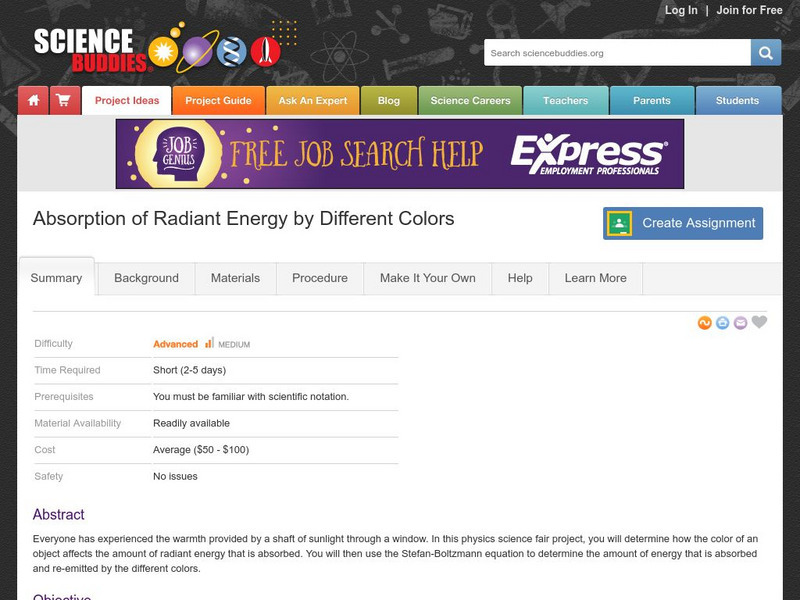Curated OER
Energy: Light -- Spinning Color Wheel
Second graders make spinning color wheels to determine how energy effects what colors look like. They paint or color a color wheel with the seven colors of the spectrum. Next, the spin the wheel to determine what happens. In order to...
Curated OER
Greenhouse Effect: A Computer Simulation
Students complete an online simulation of the greenhouse effect. In this lesson on the greenhouse effect, students use a website, similar to a webquest, to simulate and answer questions on how the greenhouse effect works. This lesson is...
Curated OER
Spitzer Sees a New Ring Around Saturn
In this Saturn's rings worksheet, students read about the Spitzer telescope that detected a new ring around Saturn. Students solve 6 problems including determining the formula for the area of a circle, finding the volume of the new ring...
Curated OER
Climate And the Greenhouse Effect
Young scholars demonstrate the greenhouse effect. They recognize that relatively small changes to our environment can stimulate significant climate changes. They determine that the "scientific method" is a process of testing hypotheses...
Curated OER
Chemiluminescence
Students explore chemiluminescence through various experiments. In this chemistry instructional activity, students explain the chemical reaction that drives the process. They give real life applications of chemiluminescence.
Curated OER
BOUNCING INFORMATION AROUND
Students examine how satellite signals are sent and duplicate it with a mirror, flashlight and black paper.
Curated OER
The Universe in a Different Light
Students become aware of some of the objects studied in, and concepts associated with, high-energy astronomy. They do this by participating in card games that teach and review these concepts.
Curated OER
Sea Ice Research
Students study sea ice and its importance in climate and climate change. They discuss sea ice as a presence of a food source for marine animals in the arctic and complete a lab activity. After completing the lab, they watch a video...
Curated OER
Determining Red-Shift in a Receding Star
Students practice manipulating algebra formulas with more than one variable. They examine the topics of velocity, wavelength and frequency. They determine the amount of red-shift in a receding star.
Curated OER
The Goldilocks Principle: A Model of Atmospheric Gases
Students discuss the characteristics of the Goldilocks Principle. They discover the pressure and chemical composition of Venus and Mars. They discuss how the Earth's temperature is affected by the atmosphere.
Curated OER
Can You See the Music?
Fourth graders examine the makeup of the electromagnetic spectrum and how the various forms of EMRs are similar and different from each other. They, in pairs, solve problems from worksheets imbedded in this lesson plan.
Curated OER
Physics- global warming
Students discuss the concept of global warming and view a multimedia clip on the global warming phenomenon. They statistically analyze mean temperature data and compare a given set of data. Data on atmospheric CO2 is done then they...
Curated OER
It's All In The Surface: The Effects Of Color & Texture On The Ability Of A Surface To Absorb Solar Energy
Ninth graders examine how dark surfaces absorb more light than light surfaces. They perform an experiment that compares various surfaces abilities to absorb heat, then record and analyze the results.
California Institute of Technology
Nasa: Infrared Astronomy
A complete, multi-page tutorial on infrared radiation and its importance to astronomical studies.
Florida State University
Florida State University: Nature of Electromagnetic Radiation
This site from The Florida State University provides an informational page on electromagnetic radiation discusses the characteristics and properties of its many forms including X-rays, gamma rays, ultraviolet radiation, infrared...
NASA
Nasa: Mission: Science: Electromagnetic Spectrum: Infrared Waves
Infrared light lies between the visible and microwave portions of the electromagnetic spectrum. Infrared light has a range of wavelengths, just like visible light has wavelengths that range from red light to violet.
Other
Simple Science: Hurricane Central
Learners investigate images of Hurricane Katrina as it moved through the Gulf of Mexico in August 2005. The resource has students examine images, infrared radiation, water vapor, and visible radiation to plot and measure the path of...
Science Struck
Science Struck: Working of an Infrared Thermometer
Learn how an infrared thermometer works and what each of its parts does. A chart lists the different applications of infrared thermometers by the wavelength each emits.
Oklahoma Mesonet
Oklahoma Climatological Survey: Overview of Radiation
This site details what radiation is, the physics of radiation, and radiative transfer as it occurs in nature. Content explores the electromagnetic spectrum, electromagnetic waves, properties of radiation, and solar radiation.
Khan Academy
Khan Academy: Infrared and Ultraviolet/visible Spectroscopy Questions
Practice questions over infrared and ultraviolet/visible spectroscopy questions.
Science Buddies
Science Buddies: Absorption of Radiant Energy by Different Colors
In this science fair project, use an infrared thermometer to measure the temperature of differently colored paper exposed to sunlight, and calculate energy emission using the Stefan-Boltzmann equation. Find discussion questions, a list...
NASA
Nasa: Space Place: What Is Infrared?
See images and read about examples of infrared rays, and learn how they behave in different conditions.
PBS
Pbs Nova: Dirty Bomb: Sources of Radiation
In this interactive, learn about sources of both beneficial and harmful radiation which exist in many forms all around us.
Other
Advanced Technologies: Infrared Thermographic Inspections
The home page of Advanced Integrated Technologies, a company which specializes in thermographic technologies. Several pages are available which explain infrared thermography and discuss its benefits and applications.


